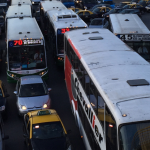 I saw exactly one woman cab driver in Buenos Aires, the morning of our last day (a day reserved for an art museum and a nice lunch, before an overnight flight). I had planned to walk a bit further before flagging a cab–save a few pesos, get some exercise in anticipation of hours and hours of sitting–but there she was, LIBRE light lit, stopped at a traffic light where we were crossing the street. I was curious; we got in. But she didn’t seem inclined to talk, so I didn’t either. It was about 11:00 on a Sunday morning, light traffic, light clouds.
I saw exactly one woman cab driver in Buenos Aires, the morning of our last day (a day reserved for an art museum and a nice lunch, before an overnight flight). I had planned to walk a bit further before flagging a cab–save a few pesos, get some exercise in anticipation of hours and hours of sitting–but there she was, LIBRE light lit, stopped at a traffic light where we were crossing the street. I was curious; we got in. But she didn’t seem inclined to talk, so I didn’t either. It was about 11:00 on a Sunday morning, light traffic, light clouds.
The driver had a USB drive plugged into the dashboard. She skipped ahead now and then when she didn’t like a song. We mostly listened to Def Leppard. And her GPS, common in cabs, was set to English. My first thought was, she’s practicing her English–lyrics in English, directions in English. A limited-situation vocabulary, maybe, but then, whose isn’t? My next thought was a story about someone learning languages from her car. Then I noticed our driver was ignoring most of the nice recorded lady’s instructions, and then I noticed that the nice recorded lady had the kind of Spanish pronunciation that makes a language teacher writhe and cringe–even an (I hope) compassionate one, eager to give each person space and freedom to speak, to say what they can, to participate. But these were street names mangled beyond the comprehensible. This was on-the-ground, rubber-meets-the-road navigation distinctly detached from its actual surroundings. Maybe she didn’t understand the English; maybe she didn’t understand the pronunciation.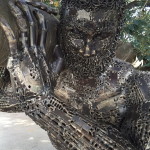
It didn’t matter. She got us to the museum by a nice, direct route. Perhaps there was some comfort in that recorded voice, a kind of company–even in the wrong language–when she knew perfectly well how to get where she was going. I remembered another drive in Argentina, several years ago, guided by a friend’s also often-overridden GPS. That one had a distinctly Spanish (Peninsular) accent; my friend called her La Gallega. More often than not, it seems, someone talks back to the GPS–praise or blame or just amusement.
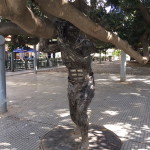
We reached our destination. But the cab driver didn’t have change.
I had visited an ATM for just the right number of pesos (or so I intended) to get me through the day with none left over, a sort of traveler’s Price is Right. ATMs dispense only AR$100 bills. It’s the largest bill there is, and as such something of a problem. Later, over coffee, I read a newspaper article detailing the complaints of locals having to carry a fistful, pocketful, pocketbookful of bills to settle their accounts. Depending on the exchange rate–official, not so official–100 pesos was worth $6 to $10 US while I was there. Not a huge sum for the largest banknote in the land.
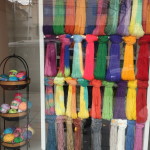
The driver couldn’t come up with forty pesos change; aside from that hundred, I could only offer her thirty-two. She didn’t suggest charging me half fare. She drove us around the block (taxímetro stopped), parked outside a massive grocery and everything else store–open on Sundays–took her bag and keys and phone, asked me to stay in the car, and went inside for change. Five minutes later she was back, and we completed the transaction and went our separate ways.
Which meant into the store, my son and I, having still a little time before the museum opened. We wanted plane snacks, and I love grocery stores in countries not my own–I like to see what there is on the shelves, what people buy to eat, what the checkout method and bulk food weighing and bag check systems are. We bought some candy, a couple of oranges, some chips. Grocery tourism is most fun when you have a local kitchen to go home to, but algo es algo.
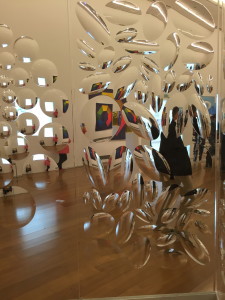
Then art, grilled chipirones, a big glass of wine. 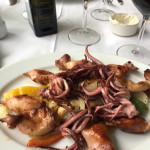 A little more walking, hot tea with milk, a banana licuado for the boy, a second banana licuado for the boy, and many airport lines. The driver in the car to the airport talked to me about Mixed Martial Arts and the benefits of martial arts study (especially for girls). He never turned on a GPS, in any language.
A little more walking, hot tea with milk, a banana licuado for the boy, a second banana licuado for the boy, and many airport lines. The driver in the car to the airport talked to me about Mixed Martial Arts and the benefits of martial arts study (especially for girls). He never turned on a GPS, in any language.